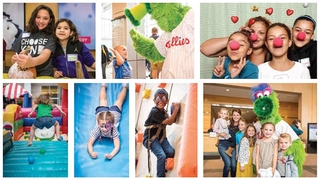Having a congenital appearance difference may present a variety of challenges for children and their families. The dedicated clinical psychologists and social workers that make up our psychosocial support services team help patients and their families navigate these challenges and maximize a child’s well-being throughout the entire treatment process.
Children born with cleft lip and palate often go through transition periods as they grow, and families often have a variety of treatment decisions to make. Our team supports families in making these decisions and coping with social or emotional challenges during every stage of treatment and development.
Our psychosocial support team works closely with families and the child’s surgical team to:
- Help them understand the surgeon’s recommendations, the risks and benefits of surgery, and the options available
- Develop coping skills to ease the fears, worries and anxieties that naturally come up around surgery and other procedures
- Provide information about the recovery process
- Identify questions or concerns a family may want to share with the medical team
- Explain procedures to a child in terms they can understand
Children with cleft conditions may be at higher risk for developmental delays, learning difficulties, and trouble with attention, concentration, memory and skills like organization and planning. We facilitate psychoeducational, developmental or neuropsychological assessments as appropriate.
As a child reaches adolescence, he or she will likely encounter all of the normal issues that adolescents and teens face — teasing and bullying, body image, dating, starting at a new school, emerging independence, and more. These times can be challenging for all children, and having an appearance difference may add a unique stressor to an already difficult time. We connect youth and their families with support resources in their community at every stage of development to help the child feel their best emotionally, behaviorally and socially.

Reference
Facilitating positive psychosocial outcomes in craniofacial team care: strategies for medical providers. Stock NM, Marik P, Magee L, Aspinall CL,Garcia L, Crerand C, Johns A, Cleft Palate Craniofac J. 2020;57(3):333-343.
Featured in this article
Specialties & Programs
Having a congenital appearance difference may present a variety of challenges for children and their families. The dedicated clinical psychologists and social workers that make up our psychosocial support services team help patients and their families navigate these challenges and maximize a child’s well-being throughout the entire treatment process.
Children born with cleft lip and palate often go through transition periods as they grow, and families often have a variety of treatment decisions to make. Our team supports families in making these decisions and coping with social or emotional challenges during every stage of treatment and development.
Our psychosocial support team works closely with families and the child’s surgical team to:
- Help them understand the surgeon’s recommendations, the risks and benefits of surgery, and the options available
- Develop coping skills to ease the fears, worries and anxieties that naturally come up around surgery and other procedures
- Provide information about the recovery process
- Identify questions or concerns a family may want to share with the medical team
- Explain procedures to a child in terms they can understand
Children with cleft conditions may be at higher risk for developmental delays, learning difficulties, and trouble with attention, concentration, memory and skills like organization and planning. We facilitate psychoeducational, developmental or neuropsychological assessments as appropriate.
As a child reaches adolescence, he or she will likely encounter all of the normal issues that adolescents and teens face — teasing and bullying, body image, dating, starting at a new school, emerging independence, and more. These times can be challenging for all children, and having an appearance difference may add a unique stressor to an already difficult time. We connect youth and their families with support resources in their community at every stage of development to help the child feel their best emotionally, behaviorally and socially.

Reference
Facilitating positive psychosocial outcomes in craniofacial team care: strategies for medical providers. Stock NM, Marik P, Magee L, Aspinall CL,Garcia L, Crerand C, Johns A, Cleft Palate Craniofac J. 2020;57(3):333-343.
Contact us
Cleft Lip and Palate Program